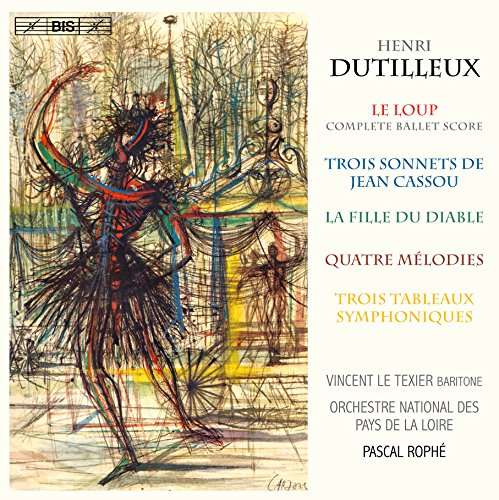DUTILLEUX Le Loup
View record and artist detailsRecord and Artist Details
Composer or Director: Henri Dutilleux
Genre:
Orchestral
Label: BIS
Magazine Review Date: 01/2016
Media Format: CD or Download
Media Runtime: 74
Mastering:
DDD
Catalogue Number: BIS1651

Tracks:
| Composition | Artist Credit |
|---|---|
| (Le) Loup |
Henri Dutilleux, Composer
Henri Dutilleux, Composer Orchestre National des Pays de la Loire Pascal Rophé, Conductor |
| (2) Sonnets de Jean Cassou |
Henri Dutilleux, Composer
Henri Dutilleux, Composer Orchestre National des Pays de la Loire Pascal Rophé, Conductor |
| La Fille du Diable, Movement: Extracts |
Henri Dutilleux, Composer
Henri Dutilleux, Composer Orchestre National des Pays de la Loire Pascal Rophé, Conductor |
| (4) Mélodies |
Henri Dutilleux, Composer
Henri Dutilleux, Composer Orchestre National des Pays de la Loire Pascal Rophé, Conductor |
| Trois Tableaux Symphoniques |
Henri Dutilleux, Composer
Henri Dutilleux, Composer Orchestre National des Pays de la Loire Pascal Rophé, Conductor |
Author: Philip Clark
The music he composed for Henri Decoin’s 1946 film La fille du diable and for a 1945 Paris stage adaptation of Wuthering Heights, which he recycled as Trois Tableaux symphoniques, is grounded in the gestural vocabulary of Hollywood’s best: composers like Franz Waxman and Dimitri Tiomkin. This music might play it safe harmonically but Dutilleux splashes orchestral timbres around with the abandon of an action painter, as blood-curdling swoops from an ondes martenot add local colour. Pascal Rophé and his Orchestre National des Pays de la Loire take these scores at face value, carving through notes with flamboyant cliffhanger urgency.
But the standout work is Le Loup, Dutilleux’s 1953 ballet score, recorded only once before in 1954 and talked up habitually as a neglected masterwork. Personally, I’m not so sure. Rophé lends the 30-minute structure symphonic grandeur but, three decades after Stravinsky had reset the debate regarding ballet music, Dutilleux’s score sounds functional and reheated – bitonality pilfered from Ravel’s Boléro (just as that 1946 film score keeps threatening to mutate into Daphnis et Chloé) with a palpable Les Six-derived energy keeping the music afloat. More pertinent to Dutilleux’s future is the aphoristic Trois Sonnets de Jean Cassou (1954), sung with gossamer delicacy by Vincent Le Texier, the discreet, cryptic lyricism characteristic of Dutilleux’s later work now in clear evidence.
Discover the world's largest classical music catalogue with Presto Music.

Gramophone Digital Club
- Digital Edition
- Digital Archive
- Reviews Database
- Full website access
From £8.75 / month
Subscribe
Gramophone Full Club
- Print Edition
- Digital Edition
- Digital Archive
- Reviews Database
- Full website access
From £11.00 / month
Subscribe
If you are a library, university or other organisation that would be interested in an institutional subscription to Gramophone please click here for further information.




